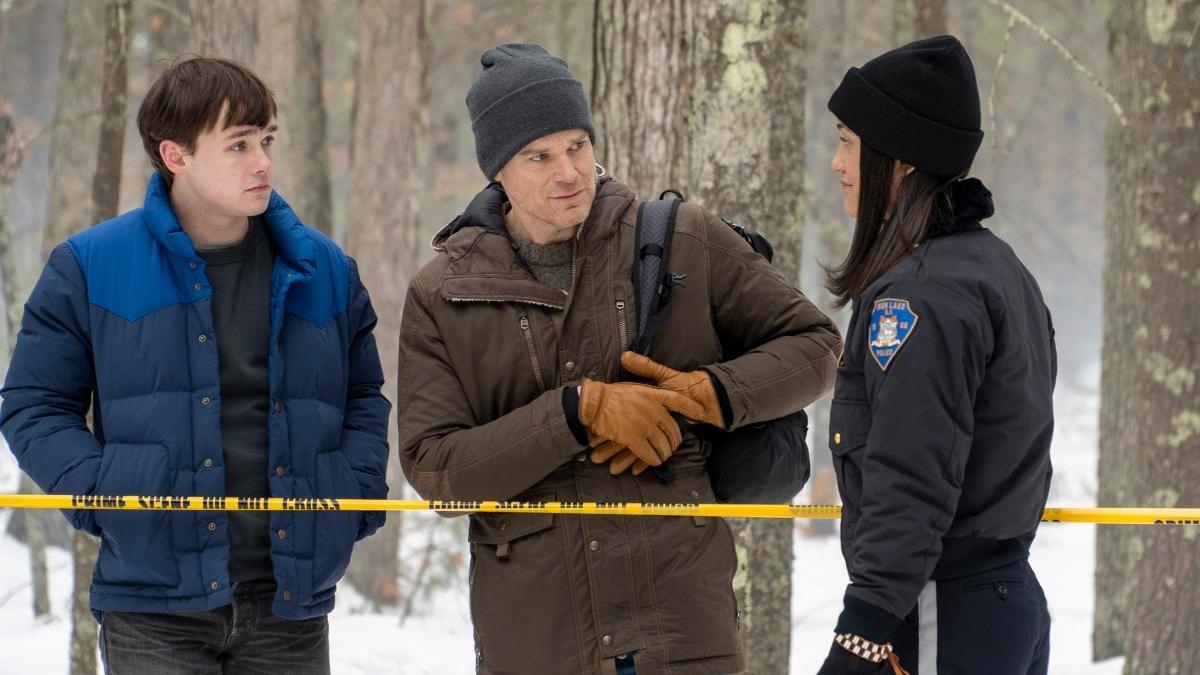Harrison confronts his daddy issues as Dexter: New Blood fumbles forward
There are plenty of new characters in "Storm Of Fuck," but Dexter Morgan is missing in action.


Dexter Morgan is not in Iron Lake, New York.
Not just in the sense that the character spent the past decade weaving himself into the social fabric of the town as Jim Lindsay, firearm salesman by day, boot-scootin’ boogier by night. The Iron Lake iteration has the same face and similar traits, like the inner-monologued Dad jokes, but it’s pretty amazing that Harrison so easily recognized this guy. I served with Dexter Morgan. I knew Dexter Morgan. Dexter Morgan was a friend of mine. Jim Lindsay is no Dexter Morgan.
Which makes “Storm Of Fuck” a pretty odd episode to watch as a long-time viewer. It’s clearly designed, as was the premiere, to shuttle the audience back into Dexter’s world as efficiently as possible even if that requires a dogpile of contrivances. And sure enough, by the time it’s over, most of the show’s basic infrastructure is back in place. Dexter has made one of his famous homicidal messes and has to clean it up while law enforcement is too close for comfort. He’s arguing with an externalized conscience and struggling to keep his private life from capsizing his public one. There’s even what appears to be a serial killer tormenting a captive girl. Seems the only thing missing from this version of Dexter is… well, Dexter.
That’s due in small part to Dexter’s rustiness. He’s fallen further out of practice than any other time in his life since maybe the immediate aftermath of Rita’s murder, when he had to be slightly more careful as an automatic person of interest in his wife’s gruesome death. Dexter has spent 10 quiet years as a homicidal 12-stepper, but now that he’s become impulsive and sloppy enough to kill someone and carry a blood trail back to his cabin, Dexter’s pink cloud has been replaced by the copulatory squall the episode is named for.
It’s bad enough that Dexter has to try to get rid of a blood trail as his until-recently estranged son sleeps inside. But then Angela arrives, unannounced and with an impressive calvary, to inform Dexter that Matt Caldwell has gone missing nearby and she assumes he won’t object to her setting up base camp outside his place. As if no time has passed, Dexter is left scrambling to clean up his mess by insinuating himself into a crime scene as a throng of people mill about and threaten to expose his involvement.
There’s still something irresistible about any scene in which Dexter gets to play an archetypal trickster, skulking around and using his considerable guile to shift suspicion away from himself. By the time Dexter had gotten to its sixth or so season, it was mostly frustrating to watch Dexter continue to escape accountability while surrounded by supposedly competent law enforcement professionals. With a new setting and a new police force, Dexter’s sleight-of-hand is much more satisfying. And the maneuvering is all the more impressive because it takes place right under Harrison’s nose as Dexter tries to ensure he can be a good father by what he believes to be an unfortunate but necessary tumble off the wagon.
Thanks to Dexter’s quick thinking and old instincts, Angela’s investigation into Matt Caldwell’s disapperance is brought to an early conclusion. The narrative, as Dexter describes his creation in the back-like-it-never-left voiceover, is that Matt panicked upon realizing he had shot a rare white buck on protected Seneca land. Then Matt, who previously killed five people in a game of bet-the-house bumper boats, was so afraid of facing a misdemeanor wildlife violation and nominal fine that he hitchhiked out of town and could be living as Jim Lindsay in rural Wyoming. Who knows, y’know? It all sounds plausible enough to police chief Angela, who Dexter makes a point to tell us in voiceover is actually really competent at her job. Seriously, stop laughing! She’s top-notch police!
Sure, it’s all kind of silly, but it’s silly in precisely the way Dexter is at its best. There’s still fun to be had in watching Dexter hide his crimes against the world’s worst people from the world’s worst detectives. And yes, this version of that is like macaroni and cheese from a microwaveable tray rather than from a glass baking tray, but it’s still pretty comforting in its own right. Too bad, then, that so little else of “Storm Of Fuck” works because I’m still so confused as to what Jim Lindsay’s whole deal is supposed to be.
The episode is essentially bookended by the important conversations Dexter and Harrison need to have in order to get closure and determine a path forward for their relationship. And the more Harrison reveals, the more inscrutable this version of Dexter becomes. So first, to fill in the past decade for poor, poor Harrison. Harrison says he was doing well enough in Buenos Aires with Hannah, who he refers to as his stepmom, until she died from pancreatic cancer three years ago. He was then deported back to Miami, where he bounced around the foster care system before setting off to find Dexter, first using the return address from a letter Dexter sent from Oregon, then using social media to track him to Iron Lake.
The entirety of Harrison’s path from Argentina to Iron Lake is a logical sieve, but let’s say this all happened exactly as Harrison is describing it. That means the same person who spent the entire episode three steps ahead of the police force, a sizable chunk of the townsfolk, and the indigenous people of the region also mails check-in letters with a return address placing him in Lots-o-Logs, Oregon. That guy poses for photos that get circulated on Instagram along with a friend’s boasts about what a dynamite bowler he is. He’s a pillar of his community. He is decidedly on the grid.
But what’s the point of Jim Lindsay, exactly? The persona is no longer a means of holding himself accountable for years of bad behavior, which was supposed to be the point of the original ending everyone hates so much. Dexter was far removed from sun-soaked Miami, doing backbreaking forestry work in the cold without the social support system he had grown to rely on but couldn’t trust himself with. He might have escaped formal punishment, but he was trapped alone in a prison of his own design.
Well, he apparently got sick of that and relocated to Iron Lake for a more comfortable job and a life that is fuller and more robustly normal than Dexter Morgan’s ever was. He clearly has no fear of being discovered, or he wouldn’t be posing for the ‘Gram after rolling a 300. If we’re to believe that Harrison, an entire teenager, tracked Dexter to Iron Lake, it’s tough to also believe that Dexter was making even a modest effort to evade capture. (It’s possible that Debra was teaching a six-year-old Harrison the fundamentals of skip tracing prior to her death, but that’s not part of any canon I’ve seen.)
It’s no longer clear what purpose Jim Lindsay serves, if not to punish Dexter for his crimes or to help him evade capture. If he’s spent the last decade as a recovered addict and has rebuilt a normal life and routine around work, responsibilities, romance, friends, and hobbies, then that’s great for Jim Lindsay. The Dexter I know is a misanthropic weirdo who has practiced how to behave like a human in order to preserve his freedom but is ever the trickster. He’s fooling everyone around him with a performance of a person who doesn’t actually exist. Jim Lindsay seems to actually exist as if the performance has become real.
Whatever this current version of Dexter is, he’s the most prepared for parenthood than he’s ever been in his life. He’s gotten a cot for Harrison to sleep in and will be enrolling him in school alongside Angela’s adopted daughter Audrey. Rather than seeing Harrison as a terrifying burden and a ticking time bomb, he sees him as an opportunity to redeem Dexter Morgan rather than pretending to be Jim Lindsay. And he truly seems to crave fatherhood, which further contributes to the feeling that this Dexter is some kind of imposter. Without some deeper insights into how and why Dexter established this life and persona, New Blood is going to feel as hollow at its core as Dexter used to feel once upon a time.
Stray observations
- The ending gives the first glimpse of our primary villain, Kurt Caldwell, who successfully urges Angela to continue the search for the missing son gruesomely buried just beneath his feet.
- The young girl Angela helped with food and money in the premiere is not in great shape, having checked into a motel she’s unable to check out of. After being drugged and robbed of her phone, she realizes she’s being watched and finds a fun little message written around the lens.
- A piercing blue eye watches the girl struggle on a laptop screen, and the editing suggests it belongs to the local energy baron, but that eye looks like Clancy Brown’s to me.
- The full-time return of Dexter’s inner monologue isn’t entirely welcome: “We need to talk. Words you never want to hear from your doctor or your girlfriend.” I groaned aloud.
- “Stop acting like you’re such an evil person. I don’t remember a lot, but all my memories of you are good. […] The worst thing you ever did was leave me.” Oh Harrison, you poor, sweet boy.
- Speaking of Harrison, Jack Alcott is excellently cast and holds his own against Michael C. Hall.
- I’m enjoying watching Hall and Jennifer Carpenter acting together again, but I don’t understand Ghost Deb either. Watching Ghost Deb taunt Dexter so mercilessly is confusing considering the last time we saw her, she was using her final breaths to absolve Dexter of responsibility so he could go on to live the happy and guilt-free life he deserves.
- Do the kids still listen to Dinosaur Jr. these days? It’s fine by me, I’m just wondering.